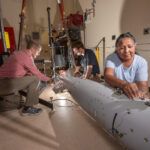President Trump: What will he do?
By Dan Drollette Jr | November 9, 2016
On the campaign trail, Donald Trump mentioned many provocative things that relate directly to the national security concerns of the Bulletin: suggesting that South Korea and Japan should develop their own nuclear weapons (after 70 years of US efforts to stop such nuclear arms proliferation); pulling out of international treaties such as the Iran agreement; calling the scientific evidence for climate change "a Chinese hoax"; saying that he would only come to the aid of our NATO allies if they are up-to-date on their bills (coyly phrased as whether they have "fulfilled their obligations to us"); stoking passions in the Middle East by threatening to ban Muslims from entering the United States, expressing admiration for Russia's Vladimir Putin … the list goes on and on.
But how much of this was just campaign rhetoric dangled as red meat by an old hand at the art of closing deals, and how much of it was for real? Can't it all be discounted as fluff, made in the throes of a hard-fought campaign, to be revisited and re-negotiated calmly in the light of day?
Unfortunately, no, says this 10-page "Letter from Washington," published in The New Yorker. On average, once presidential candidates are in office, they typically manage to fulfill about 73 percent of their campaign pledges, in some form or another. In other words, most campaign promises do indeed turn into established policy. (Which raises the question of precisely which of his pledges fall into this category.)
Titled "President Trump: What Would He Do?" and written by journalist Evan Osnos, the article gives an idea of what to expect for the next four years—even if it was published back on September 26. The article seems extraordinarily well-sourced, judging from this paragraph: "Over the summer, I interviewed several dozen people about what the United States could expect from Donald Trump's first term. Campaign advisers shared his plans, his associates relayed conversations, and I consulted veterans of five Republican Administrations, along with economists, war gamers, historians, legal scholars, and political figures in Europe, Asia, and Latin America."
Osnos sums it all up at the very end, saying that we cannot expect "that his presidency would be something other than the campaign that created it."
Publication Name: The New Yorker
To read what we're reading, click here
Together, we make the world safer.
The Bulletin elevates expert voices above the noise. But as an independent nonprofit organization, our operations depend on the support of readers like you. Help us continue to deliver quality journalism that holds leaders accountable. Your support of our work at any level is important. In return, we promise our coverage will be understandable, influential, vigilant, solution-oriented, and fair-minded. Together we can make a difference.















